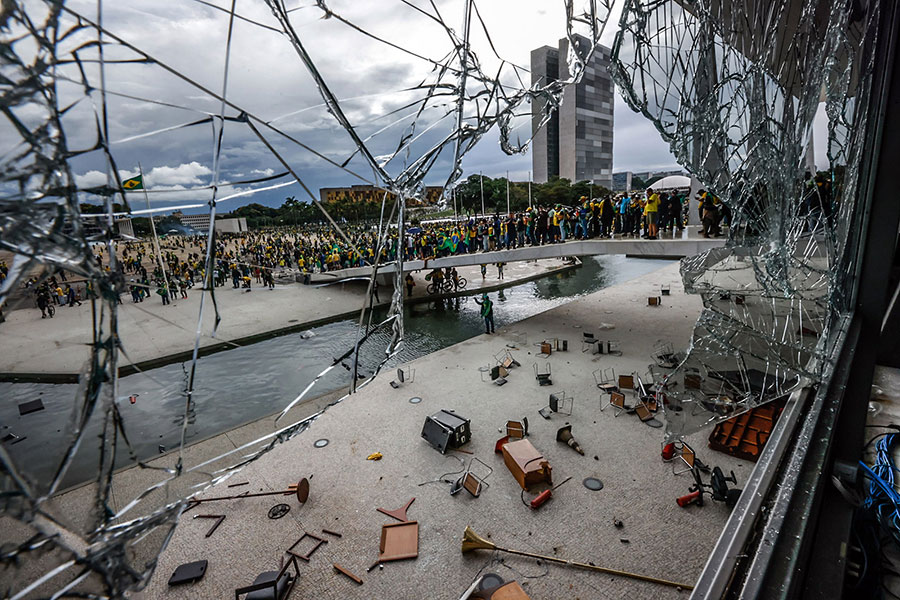Brazil: The Threat from the Right

```html
Brazil's Turbulent Democracy: A Nation Grappling with its Past and Future
A Battleground of Ideologies
Brasília's Square of the Three Powers, a symbol of Brazil's democratic ideals, became a stage for political turmoil. Designed to represent the harmonious coexistence of the judiciary, executive, and legislative branches, the square was violated by a right-wing Bolsonaro supporter attempting to assassinate Supreme Court Justice Alexandre de Moraes. This act of violence underscored the deep divisions tearing at the fabric of Brazilian society.
The conflict between Moraes and the far-right highlights the clash between two forms of authoritarianism: one that defends democratic institutions, even at the expense of individual liberties, and another that champions free speech absolutism, fostering a discourse so toxic it threatens the very foundation of these institutions.
Moraes, known for his decisive actions against disinformation and threats to democracy, has taken drastic measures, from freezing bank accounts to ordering police raids. His unwavering stance reflects the precarious state of Brazilian democracy.
"Democracy does not simply have the right to defend itself," Moraes declared in a rare interview, "it has an obligation to do so."
Lula's Return and Bolsonaro's Shadow
The return of Luiz Inácio Lula da Silva, or Lula, to the presidency marked a turning point after the tumultuous Bolsonaro era. Lula's legacy, built on his leadership of the metalworkers' union and his opposition to the military dictatorship, is intertwined with Brazil's complex political landscape. His two previous terms saw economic growth and poverty reduction, but were also marred by corruption allegations.
Bolsonaro's presidency, marked by a disastrous COVID-19 response, inflammatory rhetoric, and environmental destruction, left a deep scar on the nation. His constant attacks on the electoral system and his flight to Florida after losing the election further fueled political instability.
The January 8th invasion of the Square of the Three Powers by Bolsonaro supporters, mirroring the January 6th Capitol riot, highlighted the fragility of democratic institutions and the enduring influence of Bolsonaro's divisive rhetoric.
Corruption, Crime, and the Erosion of Trust
Brazilian politics is plagued by corruption and a deep-seated skepticism towards institutions. With numerous politicians facing criminal charges and a history of overturned convictions, public trust in the justice system is wavering. Even the "Lava Jato" investigation, initially hailed as a crusade against corruption, became mired in controversy.
The rise of evangelicalism, combined with the power of agribusiness and the pervasive influence of drug traffickers and militias, adds further complexity to the political landscape. These forces wield significant influence, impacting everything from environmental policy to social issues.
The Rise of the Far Right and the Future of Brazil
The far-right continues to gain ground, capitalizing on public anxieties about crime, economic instability, and social change. The near-success of Pablo Marçal, a controversial lifestyle coach and online influencer, in the São Paulo mayoral election, demonstrates the appeal of populist rhetoric and the potential for further political disruption.
Marçal's rise, along with Bolsonaro's enduring popularity, signals a shift in Brazilian politics, with the emergence of a new generation of far-right leaders who are adept at using social media and exploiting public discontent.
Environmental Challenges and Economic Uncertainties
Brazil faces daunting environmental challenges, including deforestation, wildfires, and water scarcity. While Lula's return has been positive for the Amazon, the Cerrado, a vital savanna ecosystem, continues to be threatened by agricultural expansion.
Economic uncertainties, fueled by inflation and concerns about government spending, add to the challenges facing the nation. The Brazilian real's decline against the US dollar reflects the precariousness of the economic situation.
An Uncertain Future
Brazil stands at a crossroads. Lula's health concerns and the lack of a clear successor raise questions about the future of the left. The enduring appeal of the far-right, coupled with deep-seated social and economic divisions, suggests that the nation's political turmoil is far from over.